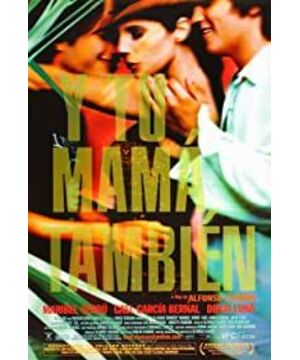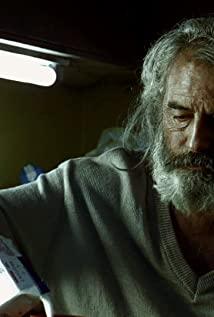Although Alfonso Cuarón is a Mexican director, he really became famous after he entered the Hollywood movie circle, "The Little Princess", "The Wind and Cloud", and the most well-known "Harry Potter 3: Azkaban" The Prisoner, and later "Paris, I Love You" and "Son of Man" are all his works in Hollywood. "The same is true for your mother" was completed by Alfonso Cuarón back to Mexico between these works.
Although in "Paris, I Love You", Alfonso Cuarón is only responsible for directing one of the short films, but at the beginning of this one seems to talk about indecent love, but it turns out that it is about the love between father and daughter. , But you can clearly see Alfonso’s style: a long shot to the end, misleading narrative techniques, natural light and even backlit images. Among them, Alfonso’s obsession with long shots has been revealed in "The same is true for your mother", and in the 2006 sci-fi work "Son of Man", his use of long shots has reached the pinnacle and incredible level.
In "Son of Man", there are many super-long shots, one of which is a seven-and-a-half-minute street fight, where the hero is charged and trapped in the rain of bullets, refugees, and continuous blasting, which is breathtaking. The other long shot that took more than four minutes in the car is even more incredible. It can already be included in the annals of film history and used as a research template for textbooks.
■The protagonist of "Same as Your Mother" are two seventeen-year-old boys, Hu Liou and Norden. Hu Liou is a rich white man, his father is a national politician, and Norden is a brown-skinned native of Latin America, born in a middle and lower class. One of my single-parent families has a sister who participates in demonstrations all day long. Hu Liou and Norden’s good friends are very typical seventeen-year-old boys, that is, two walking male hormone bags. All they think about and talk about are sex. Other than that, look at Don't care if you don't.
In the summer of 1999, the two girlfriends took a trip to Italy, leaving behind the dumb brothers and sisters who had nothing to do with them, looking around for fun to pass the time. In a grand wedding celebration that even the president attended, the boring Julio and Norden entangled a 28-year-old glamorous young woman from Spain, Lusha. Lusha is actually Hu Liou's cousin, who is dignified and decent, and ignores the two boys' accost. However, a few days later, when Lusha learned that her husband had betrayed and derailed, she took the initiative to contact Hu Liou and said that she would go to the "Paradise Mouth" beach mentioned earlier with them.
"Tian Tiankou" is actually a place where Hu Liou casually talked about it, but he was unwilling to give up the opportunity to travel with beautiful women because of this. So he and Norden drove the car with Luca, heading for a strange and remote beach on the map, and embarked on a five-day road trip dignified. In terms of nature, "The same is true for your mother" is a road movie that tells the experience of three people traveling from Mexico City to a rural beach. The main story line focuses on the dialogue and interaction between these three people, but the director is very thorough. The narration outside the painting and the flowing lens language continue to radiate fragmentary story lines outside the car, and these story lines finally piece together the real theme of the film.
When the car rushed to the deserted countryside, the three people kept chatting in the car. Unsurprisingly, the conversation is boring and childish like a 17-year-old boy, always revolving around "sex", such as when did it first happen? What is your favorite posture? Lusa, who was still very serious, became more and more relaxed and casual as the distance stretched, and she did not hesitate to mention her first love and first experience. But when she said that her first boyfriend died unexpectedly when she was seventeen, she couldn't help but sigh and said: "My life started too late, and it was too early to meet this gentleman."
When the three people in the car kept going. When they said something silly, the narrator interrupted them from time to time and brought the topic out of the car along with the camera. For example, when passing a turning place, the narrator mentioned that ten years ago, there were two chicken coops on the side of the road. A few hundred meters along the chicken coop, the owner of the chicken coop, a pair of mother and daughter lying down. Where they died, and when the three people's car drove forward, the window swept past to reveal two extremely simple wooden crosses standing on the side of the road.
Such narrative styles such as inside/outside the car, story characters/film narrations, each saying their own words, are constantly going on. During this journey, Hu Liou and Norden gradually discovered some facts they didn't know before. When Hu Liou first had a relationship with Lusha, Norden admitted under jealousy that he had been to Hu Liou's girlfriend, and when Norden later had a relationship with Lusha, Hu Liou also angrily admitted that he had been to Norden's girlfriend. Fortunately, Lusa played a round in the middle, and these two good friends rebuilt the old one after the quarrel. But Lusha also told them frankly that their bed skills were rotten to death.
In the meantime, the camera and the narration "drifted away" from the three people intermittently, drifting to the poor villages on the roadside, the vehicles intercepted and harassed by the police, the country folks washing dishes and cooking in the restaurant kitchen, and there was nothing on the beach. A fringe who lives together. There is no relationship between these branch line segments. The protagonists neither know the existence of these branch line segments, nor have any relationship with these branch line segments until the end. However, there is a very close relationship between the three protagonists.
The end of this journey is the non-existent "Paradise Mouth" beach. Somehow, these three people actually found an extremely clear beach called Paradise Mouth. That night, the three people relaxed and drank a lot of beer. As a result, under the influence of alcohol, both Hu Liou and Norden admitted to each other that they had sex with each other's girlfriend more than once, and they were joking between playing and laughing. In other words, not only have you been with your girlfriend, but also your mother... What is even more exaggerated is that the three of them went to bed together that night and played a three-person game. But the next morning, when Hu Liou and Norden woke up and found themselves lying naked in each other's arms, they couldn't help but vomit, and they decided to end their vacation and leave for home immediately. Luca was relaxed, choosing to stay by the sea alone to enjoy the freedom she finally got.
After Hu Liou and Norden returned to the city, they stopped talking because of embarrassment. When the two girlfriends returned from Italy, they also broke up with their girlfriends. The two met again, nine months later. At that time, Hu Liou was already in college and Norden was starting to work. The two met by chance on the road and went to the restaurant for a cup of coffee out of courtesy. At this time, Norden learned from Hu Liou that Lusha had passed away a month after they left the mouth of heaven. She suffered from cancer, which was in the terminal stage and the cancer cells had spread early throughout the body. In 2000, the ruling party lost the election and Hu Liou's father also stepped into the political arena. After saying this, the two shook hands amicably and said goodbye, and they never contacted again.
■On the surface, "The same is true for your mother" is a somewhat erotic youth movie, vividly depicting the growth of the two seventeen-year-old boys, Hu Liou and Norden, starting from a state of excessive self-consciousness and completely controlled by physiological impulses. After experiencing a beautiful journey with a beautiful young woman, she learned some hidden secrets and finally learned to care about external things and be responsible for herself. But in fact, this film has deep political implications. The road trip in it shows not only the status of the characters, but also the political environment of Mexico at that time.
The beginning of the story in the film is in 1999 and the end is in 2000. This time setting is extremely important. The Mexican Revolutionary Institutional Party was established in 1929, and then began a 71-year ruling period. It was not until the defeat in the July 2000 elections that it officially stepped down to the throne and was brought to power by the opposition Reform Alliance. In modern history, why is the party that has been in power for the longest time being ousted by the people? The scenes and narrations that keep "drifting away" in "The same is true for your mother", and those seemingly unwilling side clips are the reasons for this.
In these clips, you can see the "Zhumen stinky wine and meat, and freezing dogs on the road." You can see the extravagant corruption of officials and the poverty and downfall of the people, as well as the sharp gap between the rich and the poor, the oppression of the people, and the high-ranking people's grievances behind them. Surrounded by these seemingly trivial and irrelevant environments are the naive boys Hu Liou and Norden, who are very different in identities, but are called brothers because they "don't know the facts." During this journey, when the two learned the truth one after another and knew that the other had been doing themselves behind their backs, they finally had to part ways and go their own way. As for Lusha, like Mexico, a country that has been eroded by corrupt cancer cells, "Life starts too late, and it is too early to meet the wrong party."
"The same goes for your mother" is actually very much like the Chinese movie "Let the Bullets Fly" some time ago. It uses spoofing techniques to carry out political satire. In terms of artistic techniques and ideological connotations, it is not particularly good, but it is very interesting. Don't have a taste.
View more about Y tu mamá también reviews











